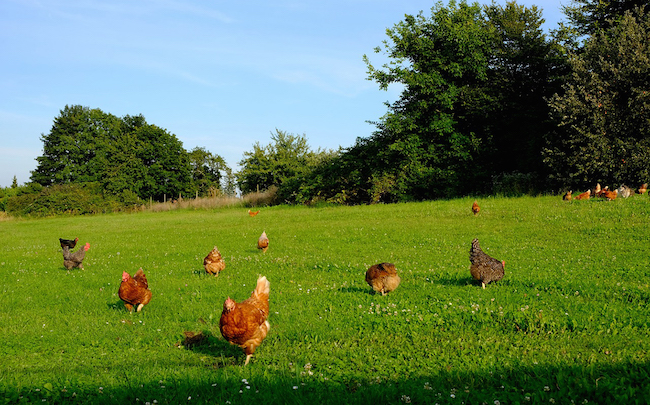
The Danger of OTA's Lawsuit Against the USDA
Last week, the USDA made the controversial decision to withdraw the proposed Organic Animal Welfare Standards, also known as the Organic Livestock and Poultry Practices rule (OLPP). Originally approved on the day before President Obama left office, OLPP has already been delayed three times by the Trump administration and was facing heavy criticism by politicians who advocate for Big Ag.
With the goal of improving how livestock are raised, OLPP, among many other things, would have outlawed porches and established minimum indoor space for birds.
While the withdrawal of OLPP is an unquestioned setback to the organic movement, it should not come as a huge surprise, especially given the current president’s aversion to regulation.
There are two things we need to take into consideration here:
1) The OTA lawsuit could make things A LOT worse for organic On September 13th, the OTA sued the USDA over its failure to implement the OLPP.
While this lawsuit may be successful in getting the USDA to put into effect the rule that President Obama signed, it could also be incredibly harmful to the industry if OTA loses this case in court.
The main justification that the USDA used in withdrawing OLPP was based on its interpretation of the Organic Foods Production Act of 1990 (OFPA). The USDA wrote that it “believes OFPA does not authorize the animal welfare provisions of the OLPP final rule” and “that it lacks the power to tailor legislation to policy goals.”
This means that if an organic policy is not explicitly stated in OFPA, the USDA cannot use OFPA as guidance and create a regulation to advance the organic industry. This line of thinking goes against the previous administrations, all of whom created organic regulations based on the spirit and intent of OFPA.
In its Federal Register comments, the USDA also mentioned Chevron vs. NRDC, a landmark case from 1984 which defers to a federal agency regarding the interpretation of a statute.
According to Marie Burcham, Farm and Food Policy Analyst at The Cornucopia Institute, “If the court says the USDA has broad authority to interpret OFPA and acted legally with OLPP, the USDA may ask itself why the other organic regulations approved in the past are okay. It is a very slippery slope.”
As such, the USDA might feel that it has strong legal ground to rescind previously enacted organic regulations, which has the potential to completely dismantle the entire organic industry.
This all comes down to how an administration wants to interpret OFPA.
Does it want to interpret OFPA literally and not create any new regulations? Or, does it want to interpret OFPA broadly and use it to create regulations that move the organic industry forward?
With the Trump administration, it is definitely the former, not the latter.
2) Pressure must come from consumers When it comes to failing to abide by the many different rules of the National Organic Program, litigation is often the answer.
While this is a necessary approach, it is also a costly, lengthy, and oftentimes an ineffective one. Additionally, litigating over enforcement is very difficult.
Andrew Kimbrell, Executive Director of the Center for Food Safety, believes a different approach is needed.
“Organic standards won’t be saved unless consumers see the stakes. Organic is a lifesaver. Organic is not a lifestyle, as it is currently being sold. We have to change that perception, with scientists taking part in massive TV and radio campaigns validating the health benefits of organic and warning people about the serious risks of pesticides. Consumers will care about enforcement when they know the cost of lack of enforcement,” he said.
As we have seen in the past, when consumers truly get behind an issue and pressure politicians, change can happen.
While the GMO-labeling bill that was signed last year is a horrible one, a bill did get passed. Furthermore, the massive GMO-labeling campaign has caused many major food companies to part ways with the Grocery Manufacturers Association, the powerful lobbying arm of Big Food who fought tooth and nail against consumers in the battle to label GMOs.
Consumers can make an impact, but their concern must be real, widespread, and relentless. The support for organic has to be so strong that Congress has no choice but to defend it and pass legislation which the USDA must enforce.
Fortunately, there are politicians in Washington, D.C. who are standing up for organic.
Chellie Pingree (D-ME), Dan Newhouse (R-WA), and Jimmy Panetta (D-CA) introduced the Organic Agriculture Research Act to increase the funding for organic research activities to $50 million per year.
Also, Ann Kuster (D-NH) and Bob Casey (D-PA) introduced nearly identical versions of The Homegrown Organic Act of 2017 to the House and Senate, respectively. This bill will help new or existing farmers transition to organic.
Look for both local and federal politicians who care about organic, let them hear your voice, and support them.
 |
Have a great day! 
Max Goldberg, Founder |
Quick Hits
* Big congrats to Rachel Drori, founder of NYC-based Daily Harvest, who raised a whopping $43m for her direct-to-consumer, organic smoothie delivery brand.
* Fantastic news that Rodale Institute and Delaware Valley University have received $500,000 from the USDA to train a new generation of organic farmers.
* In the restaurant and juice world…..
* Baltimore’s Inn at the Black Olive, which many Expo East attendees know well, is set to open L’Eau de Vie, a vegan organic restaurant. In Michigan, Loya Organic, a Pakistani organic restaurant, is celebrating its fifth year in business.
* Sadly and abruptly, LA-based Juice Served Here closed its doors with little explanation.
* Acclaimed regenerative farmer from North Dakota, Gabe Brown, will be speaking at the NOFA-Mass Winter Conference on January 13th.
* Lastly, be sure to tell Congress to support the Organic Certification Cost Share Program, which helps enable small and medium-sized organic farms to become certified. You can do so by clicking HERE.
Weekly News Summaries


No Sure Thing That Amazon Will Dominate Online Grocery Sales
By Sarah Halzack
Online grocery is an uncharted realm, and Amazon's dominance is by no means assured.

Cannabis was the Biggest Attraction at the Organic Grower Summit
By Tim Linden
At the first-ever Organic Grower Summit in California, it was standing-room only at the breakout session discussing cannabis.

(Flawed) Organic Standards for Fish are Going Nowhere -- Fortunately
By Aaron Orlowski
Despite complaints from the industry, there is no momentum for U.S. organic fish standards - a very good thing.

With the Amazon-Whole Foods Merger, Much Uncertainty for Local Brands
By Danielle Beurteaux
Months after Amazon's purchase of Whole Foods, a tremendous amount of uncertainty still exists as to how the centralized buying will impact small, local brands.


Monsanto's New GMO Seeds are Making the Company Even More Dominant
By Juliette Michel
Despite their well-publicized problems, Monsanto's dicamba-resistant seeds are giving the company a much tighter grip over the seed supply -- a very scary prospect.

Not Surprisingly, the EPA Says that Glyphosate Does Not Cause Cancer
By Geoffrey Mohan
Going against what the State of California and the World Health Organization have said, the chemical-friendly EPA claims that glyphosate does not cause cancer.


Brandless Raises $35M in a Series B Round of Financing
By Elizabeth Segran
Brandless, the company that sells organic and Non-GMO items for $3, has raised $35 million from a handful of celebrities, including NBA star Steph Curry.

NextWorld Evergreen Buys Organic Chocolate Company Alter Eco
By Jenna Blumenfeld
One of the most sustainable and forward-thinking organic chocolate companies, Alter Eco, has been purchased by private equity firm NextWorld Evergreen.

Campbell's Completes its $700M Acquisition of Pacific Foods
After some early complications, Campbell's has finally closed on the purchase of Pacific Foods.
The material in this newsletter is copyrighted and may be reprinted by permission only. All requests must be in writing. Please use our contact form to request republication rights.
Newsletter Archive
Quick Hits
* Big congrats to Rachel Drori, founder of NYC-based Daily Harvest, who raised a whopping $43m for her direct-to-consumer, organic smoothie delivery brand.
* Fantastic news that Rodale Institute and Delaware Valley University have received $500,000 from the USDA to train a new generation of organic farmers.
* In the restaurant and juice world…..
* Baltimore’s Inn at the Black Olive, which many Expo East attendees know well, is set to open L’Eau de Vie, a vegan organic restaurant. In Michigan, Loya Organic, a Pakistani organic restaurant, is celebrating its fifth year in business.
* Sadly and abruptly, LA-based Juice Served Here closed its doors with little explanation.
* Acclaimed regenerative farmer from North Dakota, Gabe Brown, will be speaking at the NOFA-Mass Winter Conference on January 13th.
* Lastly, be sure to tell Congress to support the Organic Certification Cost Share Program, which helps enable small and medium-sized organic farms to become certified. You can do so by clicking HERE.
